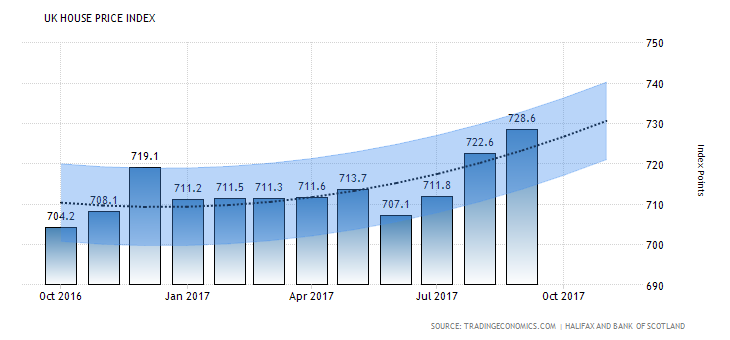Is Brexit Impact On The UK Property Market A Fallacy?
Talks between the UK and the EU on the withdrawal of Britain following Brexit have been reported to have hit a deadlock in the last few days. And on October 16, 2017, British Prime Minister, Theresa May was reported to have traveled to Brussels for a dinner with EU leaders in a bid to end the stalemate over Brexit. However, nothing is expected to be resolved in one sitting and process could take longer than anticipated.
When Theresa May triggered article 50 in March this year, many feared that this could potentially affect the financial sector of the British economy, especially the property market. This was perceived in anticipation of a decrease in foreign investment and expatriates, which would have affected both the residential and commercial property markets.
However, several reports and market data have shown that to the contrary, the UK property market has continued to demonstrate growth with a significant rise in the UK House Price Index.

The three months following the triggering of Article 50 were understandably unpredictable while the three before were relatively indifferent.
Generally, it is correct to say that during the first quarter of 2017, the UK property market barely moved as investors waited on the Article 50 decision, the same was reflected in commercial properties with London office rental rates remaining largely unchanged as reported by Prime Office Space. However, there has been a significant rise in the UK House Price Index over the last 2-3 months as demonstrated in the chart above, a fact that has surprised many.
In fact, some analysts believe that there could be a UK housing bubble that’s about to burst in the foreseeable future.
So, what exactly is behind the current rise in UK property prices?
First, the process for Britain’s separation from the EU is still ongoing and according to earlier reports, it could continue for the next few years. During this period, business transactions may continue as usual between Britain and various EU member states, which means that while the process may have some teething problems, there are still plenty of foreigners from the member countries eager to do business with Britain.
Secondly, multinational corporations that had expressed the desire to relocate their operations from the UK to other EU member states after Brexit have taken a gradual approach, which will ensure no mass job losses ensue from their departure. This means that most people who had feared for their jobs will continue to earn income and therefore boost domestic investment both in the residential and commercial property markets.
London has been the financial hub for the EU with nearly all the banks represented in the British capital. Following Brexit, the EU urged the banks to take a gradual approach as it tries to relocate its financial center from London to individual member countries with a view of eventually having a single EU capital markets supervisor.
“What we are proposing is a gradual approach,” the commission’s vice president Valdis Dombrovskis said last month. “Eventually we could arrive at a single European capital markets supervisor,” he told a news conference in Brussels.
The property market plays a crucial role in the financial sector through mortgage products for consumers, and the idea of relocating several banks from London would have created some tremors of anxiety in the credit market.
However, this has not been the case as consumers continue to drive property prices higher by taking advantage of the low lending rates with the Bank of England maintaining a 0.25% base interest rate. The low rates and the misconception of an economic crisis in the country have also attracted investors from other parts of the world including Asia and North America as they seek to take advantage of the attractive investment opportunities. This has further boosted demand in the property market.
Conclusion
In summary, several reports have suggested that Brexit is having an adverse effect on the UK property market. However, based on data, it does not appear to be so. In fact, the last couple of months have been characterized by a significant increase in property prices, which also represents the general picture for the last few years.
Therefore, while Brexit may, in the long run, affect property prices in the UK, the wait might be longer than what most would have anticipated. In addition, investors from other parts of the world are eager to take the place of those who depart following the separation from the EU.
Disclosure: The material appearing on this article is based on data and information from sources I believe to be accurate and reliable. However, the material is not guaranteed as to accuracy nor does ...
more


